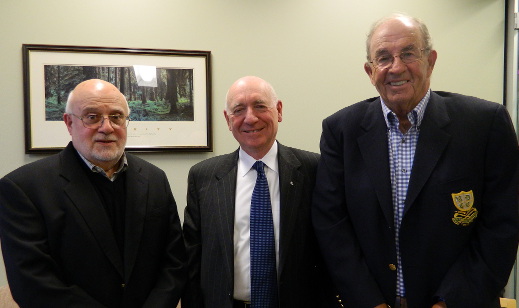Graham Scott, Rod McLeod and Gary Posen all served as Deputy Environment Ministers. Acting for the governments they served, they brought in great changes, often fighting pitched battles from within.
Since the birth of the modern environmental movement in the late 1960s, there have been great advances in the way the environment is regarded and protected in Ontario. Public knowledge and expectations about fresh air, clean water and wilderness preservation have grown, while lawmakers and politicians have responded—most times effectively—with a series of environmental protection laws, regulations, policies and programs.
The public pays less attention, though, to the behind-the-scenes work of the Deputy Ministers, the people responsible for shepherding these initiatives forward within the government and on their Ministers’ behalf. They are chosen for their administrative experience and skills, as well as their ability to serve as non-partisan executives, carrying out the policies and programs of the government of the day.
Graham Scott,
Rod McLeod and
Gary Posen all served as Deputy Environment Ministers: Scott mostly for several Progressive Conservative Ministers (Harry Parrott, Keith Norton, Andy Brandt, Morley Kells and Susan Fish), McLeod for Liberal Jim Bradley when he was Minister in 1985 (Bradley was reappointed in 2011), and Posen for both Bradley in his first round as Environment Minister and for Ruth Grier, Bradley’s New Democratic Party successor. Acting for the governments they served, they ushered in great changes, often fighting pitched battles from within.
A Deputy’s role
A Deputy Minister is one of the most important—and least noticed jobs—in the Ontario government. This is a situation that most Deputies prefer; it allows them to be non-partisan and objective.
Deputy Minister is also one of the highest ranking positions in the Ontario Public Service. As in all government ministries, the day-to-day operations of the Ontario Ministry of the Environment are handled by civil servants — scientists, engineers, lawyers, administrators, communications specialists, support staff and others — all overseen by the Deputy Minister.
The Deputy Minister acts as Chief Operating Officer: his or her job is to make sure that the policies called for by the government and the Minister get done. The Deputy also provides advice, not only counsel on the best way to deal with an issue or to get something important done but also what the political consequences of taking (or not taking) action might be.
This role has become particularly complicated for Deputy Environment Ministers in Ontario, due to the shifting and sometimes conflicting demands and expectations by different governments on environmental issues. In Graham Scott’s time as Deputy for the Ministry of the Environment (from 1979 to 1985), public interest in environmental issues exploded.
High profile public issues that arose during his tenure included the 1979 train derailment in Mississauga (which forced a mass evacuation and prompted important transportation of dangerous goods legislation both nationally and provincially), acid rain, pollution in the Great Lakes, concerns about solid and hazardous waste management, the launch of the Ontario Waste Management Corporation, and the formation of the Ministry’s new Investigation and Enforcement Branch. The first calls for an Ontario “Environmental Bill of Rights” were also raised during this period. As Ontarians became more aware of and knowledgeable about environmental issues, they wanted better answers and responses from their provincial government.
Changing expectations
Another part of Scott’s job as Deputy was to understand and explain public anxiety over the environment. He had to determine for the Ministry whether public alarm over the issues was because they didn’t like the government’s policies, or simply because they were concerned about the environment.
In 1985, the Liberal government of Premier David Peterson ended 42 consecutive years of Progressive Conservative rule in Ontario, defeating the minority PCs on a non-confidence motion and forming a new government with the support of the NDP. The Liberal party had advocated a number of activist environmental policies during the previous election campaign and, although they had narrowly lost to the PCs, the public seemed to like the Liberals’ focus on the environment.
After the new Liberal government took control, Rod McLeod was appointed Deputy in part to act as a counterweight to Liberal Environment Minister Jim Bradley, who came in with an assertive agenda, an aggressive team of young policy advisors and assistants, and a mandate to get tough on polluters and to stop acid rain.
That creative energy, with the competent leadership of the Deputy Minister’s office and the support of Ministry staff, resulted in some of the most important changes in environmental regulation in Ontario’s history, including: Countdown Acid Rain, a major program to curb smokestack emissions; the Municipal-Industrial Strategy for Abatement (MISA), regulating what flows into rivers and lakes from factories and sewage treatment plants; proclamation of the “Spills Bill” which amended the
Environmental Protection Act to place more onerous financial responsibilities on those who own or use toxic chemicals; and innovative programs and policies aimed at biomedical, household, industrial and hazardous wastes, sewer discharges, and technology-based air emission controls.
Gary Posen took over McLeod’s position as Deputy Minister in 1987. His job was to continue this balancing act at a politically sensitive time: the period after the 1987 election, when the previous joint government was replaced by a strong Liberal majority; again, in 1990, when the NDP formed the government; and later that same year, when Ontario was plunged along with the rest of the world into a deep recession.
During the time these three Deputies served the province, the media was paying more attention to the issues, the environmental movement was becoming more sophisticated and the public was better informed—and more concerned—than ever before about our air, our water, our province and our planet. The Deputy Ministers did their work as professional administrators, quietly and without fanfare, during a period marked by political challenges, escalating environmental rhetoric and entrenched opposition to major regulatory change.

